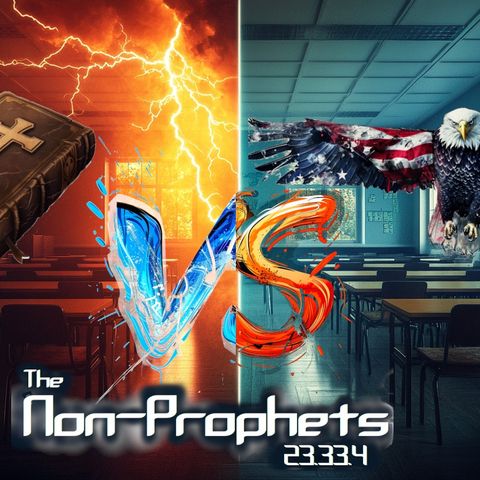US Public Schools: The New Religious Battleground

Descarga y escucha en cualquier lugar
Descarga tus episodios favoritos y disfrútalos, ¡dondequiera que estés! Regístrate o inicia sesión ahora para acceder a la escucha sin conexión.
US Public Schools: The New Religious Battleground
Esta transcripción es generada automáticamente. Ten en cuenta que no se garantiza una precisión absoluta.
Descripción
How US Public Schools Became a New Religious Battleground US News/Reuthers, By Liya Cui and Joseph Ax, on Aug. 7, 2024 https://www.usnews.com/news/top-news/articles/2024-08-07/how-us-public-schools-became-a-new-religious-battleground In a discussion centering on the tension between...
mostra másUS News/Reuthers, By Liya Cui and Joseph Ax, on Aug. 7, 2024
https://www.usnews.com/news/top-news/articles/2024-08-07/how-us-public-schools-became-a-new-religious-battleground
In a discussion centering on the tension between religion and public education in the United States, the core theme highlights the rise of Christian nationalism and its implications for American identity. Proponents of Christian nationalism assert that to be American is to inherently be Christian, a claim often bolstered by a misinterpretation of the intentions of the nation's founders. Historical evidence suggests the founders sought a secular state with a democratic foundation that allowed individuals the freedom to practice any religion or none at all. They envisioned a country based on self-determination and the separation of church and state, a principle that is currently being challenged in places like Louisiana and Oklahoma.
In Louisiana, new school policies mandate that the Ten Commandments be prominently displayed in every classroom, a move seen as a clear violation of the Establishment Clause of the U.S. Constitution, which prohibits government endorsement of religion. Meanwhile, Oklahoma's educational system has adopted a policy requiring the Bible to be taught across all grade levels, with teachers expected to integrate biblical references into their lessons. These actions are drawing criticism for infringing upon the constitutional separation of church and state and are seen as attempts to indoctrinate students with a singular religious perspective.
The conversation delves into the broader social and psychological aspects, suggesting that such policies stem from resistance to inclusivity and a desire to maintain traditional, conservative values. With a conservative majority in the Supreme Court, some lawmakers feel emboldened to push these boundaries, believing there is a possibility of getting away with such violations. The belief is that by presenting these religious teachings as fundamental to American identity, they can rally their base by portraying governmental pushback as an overreach and an infringement on religious freedom.
This discussion also touches on the potential impact of these policies on educators and students. There is concern that the emphasis on religious content will detract from the teaching of critical thinking and evidence-based knowledge. This could undermine the quality of education and the development of well-rounded, analytical thinkers. Critics argue that a government's role should be to create unity from diversity, not to impose uniformity of thought.
The conversation concludes by emphasizing the importance of maintaining a clear boundary between religion and government to prevent the criminalization of thoughts and beliefs. The current U.S. motto, "In God We Trust," is contrasted with the historical motto "E Pluribus Unum," advocating for a return to the latter as it better represents the inclusive and unifying ideals upon which the country was founded.
The Non-Prophets, Episode 23.33.4 featuring Scott Dickie, Aaron Jensen, Jimmy Jr. and "Eli" (Eli Slack)
Información
| Autor | Atheist Community of Austin |
| Organización | Atheist Community of Austin |
| Página web | - |
| Etiquetas |
Copyright 2024 - Spreaker Inc. an iHeartMedia Company

Comentarios